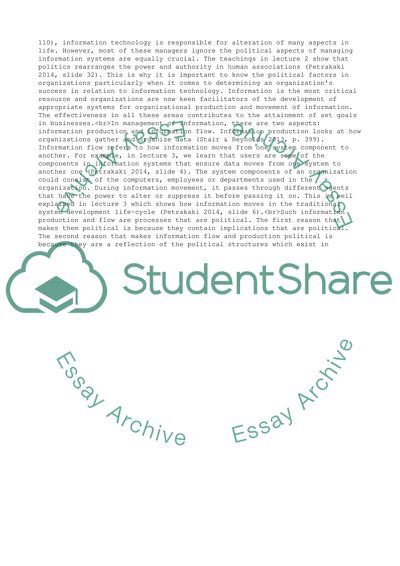Cite this document
(Information systems and technologies are political. Use two concepts Essay, n.d.)
Information systems and technologies are political. Use two concepts Essay. https://studentshare.org/information-technology/1846467-information-systems-and-technologies-are-political-use-two-concepts-from-the-module-to-illustrate-this-point-amd-reflect-on-the-implications-of-your-analysis-for-the-users-of-those-systems-and-technologies-and-or-for-designers
Information systems and technologies are political. Use two concepts Essay. https://studentshare.org/information-technology/1846467-information-systems-and-technologies-are-political-use-two-concepts-from-the-module-to-illustrate-this-point-amd-reflect-on-the-implications-of-your-analysis-for-the-users-of-those-systems-and-technologies-and-or-for-designers
(Information Systems and Technologies Are Political. Use Two Concepts Essay)
Information Systems and Technologies Are Political. Use Two Concepts Essay. https://studentshare.org/information-technology/1846467-information-systems-and-technologies-are-political-use-two-concepts-from-the-module-to-illustrate-this-point-amd-reflect-on-the-implications-of-your-analysis-for-the-users-of-those-systems-and-technologies-and-or-for-designers.
Information Systems and Technologies Are Political. Use Two Concepts Essay. https://studentshare.org/information-technology/1846467-information-systems-and-technologies-are-political-use-two-concepts-from-the-module-to-illustrate-this-point-amd-reflect-on-the-implications-of-your-analysis-for-the-users-of-those-systems-and-technologies-and-or-for-designers.
“Information Systems and Technologies Are Political. Use Two Concepts Essay”. https://studentshare.org/information-technology/1846467-information-systems-and-technologies-are-political-use-two-concepts-from-the-module-to-illustrate-this-point-amd-reflect-on-the-implications-of-your-analysis-for-the-users-of-those-systems-and-technologies-and-or-for-designers.


